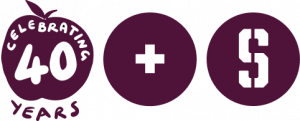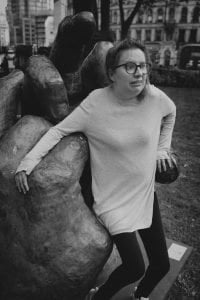I’d love it if people could read the word ‘disabled,’ notice what feelings come up and then challenge them. Try it now. Disabled poet.
I think I did have a sense that the village hall tea-party, in the middle of Norfolk, on a sunny afternoon, might not be ‘my audience’ but then, I didn’t want to judge. Maybe they’ll be bang into it, who am I to say? But when it got to the bit where I was pretending to be the grim reaper rapping about death while gyrating around their tables, stacked with cucumber sandwiches, I knew for sure that they weren’t for me. Or rather, I was not for them.
Earlier on in my show, where I was pretending to be a badger, a woman got up and left. Maybe she’s going to the loo, I thought. She did not come back.
I can never be certain why this happened. Clearly, the organisers had got the wrong end of the stick about what my show ‘To Helen Back’ was like. I should have known that when I arrived, as outside the hall , they had put up a big banner saying ‘TO HELEN AND BACK’.
Ah. Right. Sure…
I mean, it’s actually ‘TO HELEN BACK’, so when you say it, it sounds like TO HELL AND – never mind.
I had spent ages working on my blurb for them.
Spoken word/comedy/performance art (does performance art sound too pretentious?). When I put ‘performance’ I meant the fun kind. The kind where people put swimming caps on and spend eight minutes pretending to be a worm. If there isn’t a word for that, then there should be. I’d even performed a small section of the show for them – although, not the grim reaper bit, admittedly. So when they booked me, I had thought they had a good sense of the type of show I did. But somehow that got translated to a sweet little show ideal for an afternoon tea party (with cucumber sandwiches!)
After I performed, I overheard two women say it ‘really wasn’t what they were expecting’. And, while I actually quite like that kind of feedback, there is something I will never really know about the feedback I receive. In this instance, I wonder whether somewhere along the line, the fact that the show was marketed as being about ‘sickness, health and what it means to recover’ – along with myself being a disabled poet and the show being described as ‘funny’ – that this all conflated to an understanding in the organisers head, that my show was, somehow rather ‘charming’.
The sweet little disabled girl talks about hospitals with a smile. Awwwh. Maybe that’ll get in the paper.
That’s the trouble, you know. If I’m not trying to dodge the old-fashioned, incorrect assumptions about what ‘poet’ means (i.e. Shakespearean infused haiku about a leaf in wind) then I’m trying to dodge what people think ‘disabled’ means.
And I don’t want to not say I’m disabled, because there’s nothing wrong with being disabled, and sometimes, I want to talk about things like being in hospital, there’s not enough visibility given to disabled people, so hiding it doesn’t feel like the right fit for me.
(I should definitely say, for record, it’s an individual choice. No one should have to talk about their health if they don’t want to).
But the world is still an ableist place, and assumptions are rife. So if I manage to dodge words like ‘charming’, I can quite easily get hit with ‘a bit depressing’. ‘Urgh no, not disability. I can’t read a poetry book about that. Not another metaphor about being unable to climb the stairs. I can’t cope. I LOVE stairs. It’s just going to bum me out.’
And this is my least favourite assumption, because I feel so ‘othered’ by it.
So ‘what a sad little life, Jane’d.’ There might be some sad parts, but what book doesn’t have sad parts? There are also funny parts and uplifting parts and weird parts’ – urgh, see? I’m getting tired now.
Having to explain I’m just as much a human as anyone else. YAWN. I’m sick of it, to be honest.
I’d love it if people could read the word ‘disabled,’ and notice what feelings come up/they have…and then challenge them.
Try it now.
Disabled poet. Sad girl writes from behind the window looking at friends playing in the snow.
There, we see it now. It’s out. I’m not having a go at Wilfred Owen, but/for? giving school kids a lot of poems about sad disabled soldiers, but this hasn’t exactly been great for the disability movement. Maybe the curriculum could balance it out with some disabled joy?
But anyway – I’m getting distracted. The first reaction – the snow one – is over.
So now, maybe you can realise that actually, you? have no idea what a disabled poet might want to say. Maybe you can realise that actually, you haven’t really heard from a disabled poet before. Or maybe you have, but guess what? We’re not all the same!
Remember: Human. Different experiences, different lives, different perspectives. And yet – and here’s my favourite thing about poems – you can read a line from someone from a completely different life, living in a completely different body, and BOOM, it hits you dead centre.
Here comes that swell of the heart, beyond all otherness, and you think, ‘God, yeah, I get it. That is exactly how I feel.’
 About Helen
About Helen
Helen is a word-artist-spoken-poet-human performance-person. Her work mainly focuses on health, hospitals + surrealism. She is known for mixing off-beat comedy with dark subject matters. Helen is a disabled artist who is proud to be contributing to a more diverse arts sector.
Her debut poetry collection, The Underlook was published by the Poetry Business in January 2022. You can order it here
Helen has been commissioned by Apples and Snakes a number of times, writing new poetry and performing to new audiences across the UK. Helen won Gold in the Creative Futures Literacy Awards and was longlisted in the Outspoken Poetry Awards 2018. She has also facilitated poetry and writing workshops a wide range of ages and abilities.
If she wasn’t doing this, Helen thinks she’d be a pharmacist from the past or a grave digger, because she’s quite obsessed with death but in a charming way. She’s made also made some short films and been on a few podcasts.
In other news, she’s a sucker for Art History, the Curzon Film Podcast started in her kitchen, and she was once awarded a badge for swimming 100 metres.
Helen is currently working with Apples and Snakes as a Creative Access Consultant. She’s helping the team here do some work in moving forward with equality, inclusion and diversity. She has been delivering workshops and 1-1s with artists to help them build ‘Access Riders’ so that artists can highlight any specific access requirements they need to venues and other organisations upfront. Her work has been praised highly by participants and we look forward to working with her for some months to come!
Connect with Helen
Website: helenseymour.com
Twitter: @lehenner
Instagram: @whathelens

 About Helen
About Helen